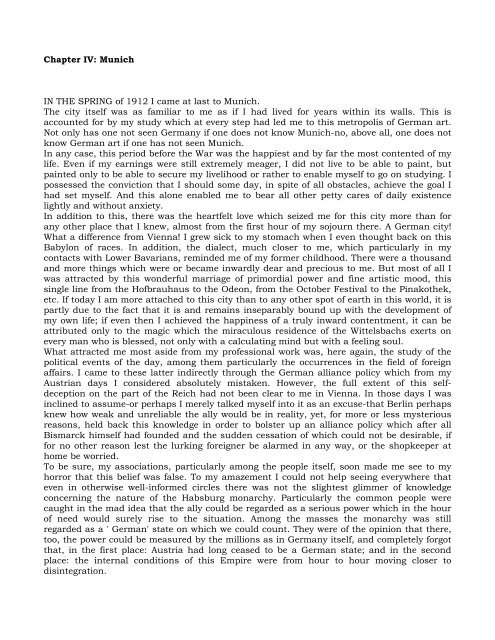Mein Kampf by Adolf Hitler
Mein Kampf by Adolf Hitler
Mein Kampf by Adolf Hitler
- TAGS
- kampf
- adolf
- hitler
- stuff2share.com
You also want an ePaper? Increase the reach of your titles
YUMPU automatically turns print PDFs into web optimized ePapers that Google loves.
Chapter IV: Munich<br />
IN THE SPRING of 1912 I came at last to Munich.<br />
The city itself was as familiar to me as if I had lived for years within its walls. This is<br />
accounted for <strong>by</strong> my study which at every step had led me to this metropolis of German art.<br />
Not only has one not seen Germany if one does not know Munich-no, above all, one does not<br />
know German art if one has not seen Munich.<br />
In any case, this period before the War was the happiest and <strong>by</strong> far the most contented of my<br />
life. Even if my earnings were still extremely meager, I did not live to be able to paint, but<br />
painted only to be able to secure my livelihood or rather to enable myself to go on studying. I<br />
possessed the conviction that I should some day, in spite of all obstacles, achieve the goal I<br />
had set myself. And this alone enabled me to bear all other petty cares of daily existence<br />
lightly and without anxiety.<br />
In addition to this, there was the heartfelt love which seized me for this city more than for<br />
any other place that I knew, almost from the first hour of my sojourn there. A German city!<br />
What a difference from Vienna! I grew sick to my stomach when I even thought back on this<br />
Ba<strong>by</strong>lon of races. In addition, the dialect, much closer to me, which particularly in my<br />
contacts with Lower Bavarians, reminded me of my former childhood. There were a thousand<br />
and more things which were or became inwardly dear and precious to me. But most of all I<br />
was attracted <strong>by</strong> this wonderful marriage of primordial power and fine artistic mood, this<br />
single line from the Hofbrauhaus to the Odeon, from the October Festival to the Pinakothek,<br />
etc. If today I am more attached to this city than to any other spot of earth in this world, it is<br />
partly due to the fact that it is and remains inseparably bound up with the development of<br />
my own life; if even then I achieved the happiness of a truly inward contentment, it can be<br />
attributed only to the magic which the miraculous residence of the Wittelsbachs exerts on<br />
every man who is blessed, not only with a calculating mind but with a feeling soul.<br />
What attracted me most aside from my professional work was, here again, the study of the<br />
political events of the day, among them particularly the occurrences in the field of foreign<br />
affairs. I came to these latter indirectly through the German alliance policy which from my<br />
Austrian days I considered absolutely mistaken. However, the full extent of this selfdeception<br />
on the part of the Reich had not been clear to me in Vienna. In those days I was<br />
inclined to assume-or perhaps I merely talked myself into it as an excuse-that Berlin perhaps<br />
knew how weak and unreliable the ally would be in reality, yet, for more or less mysterious<br />
reasons, held back this knowledge in order to bolster up an alliance policy which after all<br />
Bismarck himself had founded and the sudden cessation of which could not be desirable, if<br />
for no other reason lest the lurking foreigner be alarmed in any way, or the shopkeeper at<br />
home be worried.<br />
To be sure, my associations, particularly among the people itself, soon made me see to my<br />
horror that this belief was false. To my amazement I could not help seeing everywhere that<br />
even in otherwise well-informed circles there was not the slightest glimmer of knowledge<br />
concerning the nature of the Habsburg monarchy. Particularly the common people were<br />
caught in the mad idea that the ally could be regarded as a serious power which in the hour<br />
of need would surely rise to the situation. Among the masses the monarchy was still<br />
regarded as a ' German' state on which we could count. They were of the opinion that there,<br />
too, the power could be measured <strong>by</strong> the millions as in Germany itself, and completely forgot<br />
that, in the first place: Austria had long ceased to be a German state; and in the second<br />
place: the internal conditions of this Empire were from hour to hour moving closer to<br />
disintegration.


